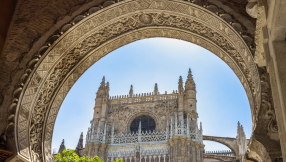
A few days ago Bishop Christopher Cocksworth published some reflections about the Church of England's Living in Love and Faith (LLF) discussions on marriage, sexuality and gender.
It is a remarkable piece of writing which you can read here (Living in Love and Faith: Where Do Things Stand? Where Do We Go From Here? and I am surprised it has not attracted more comment. The article makes a number of really quite startling admissions about LLF. It sets out fairly honestly why the C of E's bishops (and thus by extension the whole denomination) now find themselves in the possibly unresolvable mess they are in. Here are some of them:
First of all, Bishop Christopher admits that the process was too rushed at its most critical stage. In relation to the draft "Prayers of Love and Faith" he writes that the bishops "did not give the time and attention to hone the response and scrutinize the prayers with the great care that was needed..." This seems a most extraordinary state of affairs.
Secondly, he confirms what many have long suspected – that the bishops, working together, are "collegiate" in that they seek to act en masse and indeed often seem to have collective groupthink, but are, nonetheless, dysfunctional. After the draft prayers were published "it soon became clear that different bishops had, after all, different understandings of what was being provided," he states.
This was exacerbated by "statements made in press conferences that used language of blessing in a more unguarded way than the provision itself [and also the] communications of individual bishops welcoming probable, in their minds, future changes to teaching practice including, in the not-too-distant future, to marriage." In other words, after agreement was reached by the bishops on the way forward, it turned out nobody quite agreed what the agreement actually was.
Thirdly, and most fundamentally of all, Bishop Christopher admits that the cart was effectively put before the horse. Speaking of the "Pastoral Guidance" the bishops are supposed to be now producing in relation to Prayers of Love and Faith, he writes: "We promised pastoral guidelines on the practical outworking of the provision, with all their complex legal and theological questions, at a later point, rather than offering them alongside the liturgical provision. The result was that the response and prayers raised more questions than they answered..."
In other words, the Bishops came up with the prayers first rather than the theology. But how can you write prayers if you are not sure what the underlying theology is? Not only is it putting the cart before the horse, but arguably the horse has bolted and it is too late to shut the stable door as no-one knows where the stable is anyway. Don't explore that mixed metaphor too closely but you get the idea...
The bishop admits things have been done in the wrong order elsewhere when he lists some of the theological questions still to be answered by the bishops. He says these include: "Is the provision genuinely consistent with the doctrine of the Church of England?" (yes, you read that right!) and "What [are the draft prayers] saying or implying about the permissibility or otherwise of sexual intimacy in relationships of the same sex, and in opposite sex relationships that the Church does not recognize as marriage, and what is its theological case?" So the prayers were written before the answers to the key theological questions on which they rest were considered.
Finally, Bishop Cocksworth seems to concede that the bishops are out of touch not only with Synod but the wider Anglican Communion. "The proposed provision has united a broad alliance of evangelical networks, and some significant catholic voices, in suspicion, bewilderment [and] consternation..." he writes. You bet it has. And yet many bishops, although aware of potential disquiet, did not appear to see just how much concern there was. For example, a huge number of clergy turned out in person to express dismay to the Bishop of London at a face-to-face meeting arranged in her diocese last week.
Elsewhere Bishop Cocksworth admits that "among a significant proportion... [in the Church of England], trust and confidence in their bishops has eroded..." Well indeed. You have only to be aware of the prolonged, sustained applause from right across the spectrum of Synod that greeted criticism from Stephen Hofmeyer QC in the LLF debate of the way the bishops were acting in procedural terms.
And in global terms, further evidence of this being out of touch is admitted in the statement that "the knock-on effects of the Synod vote to the structures of the Anglican Communion are already being seen (as evidenced by the recent meeting of ACC [the Anglican Consultative Council]) – and the Anglican contribution to the unity of the universal Church has become less clear." The latter slightly opaque phrase seems a belated acknowledgment of the fact that the C of E is now out of step with Eastern Orthodoxy, Roman Catholicism, much of Protestantism – and, of course, with most of its own Anglican Communion. Again we ask: was this really not foreseen?
There are many other things that could be said. For example – does anyone outside the bishops really grasp the subtlety of "prayers for (for not of) God's blessing" which "seek to bless not the relationship itself... but the people" which Bishop Cocksworth believes the LLF prayers demonstrate? And what is the theology underlying that anyway?
And what is the bishops' theology of unity? Is it a rather simplistic one based on everyone being in the same structural organisation? Is it a catholic one based on desiring ultimate unity with Rome? Or is it a more Biblical understanding of organic unity coming from shared Scriptural truth? Perhaps they might like to think about this rather crucial question theologically before starting to think about organisational questions going forward.
All in all, it is more than a bit of a mess. Sadly what has been demonstrated once again is that there are two groups in the C of E, bishops among each of them, who hold completely opposite and absolutely irreconcilable views on this issue. Matthew Roberts has helpfully set this out here (What has just happened in the Church of England? (christiantoday.com). It's heart-breaking.
What now? Bishop Christopher admits that the next and final stage of "Living in Love and Faith" is "likely to be the most difficult". And that is undoubtedly true, given all that he admits in his essay. But sometimes the only way is to be completely honest and plan accordingly.
The United Methodist Church has already shown the way (see United Methodist Church Announces Plan to Split Over Same-Sex Marriage in the New York Times) by recognising that attempting to reconcile two sets of irreconcilable ideas is ultimately futile. It thus formulated a plan to divide its denomination into two entirely separate groups in a thought-through, relatively amicable and neat way (even if it hasn't worked out quite so neatly in practice due to Covid).
Could our bishops ever come up with something as simple in its refreshing clarity, honesty and genius?
David Baker is Contributing Editor to Christian Today and Senior Editor of the newspaper and website EN, available at less than the cost of a cappuccino per month at https://www.e-n.org.uk in print and online. He writes here in a purely personal capacity.
Editor's note: This article was updated on 6 March 2023 to clarify Bishop Cocksworth's role as chair of the Co-ordinating Group responsible for the creation of the 'Living in Love and Faith' teaching and learning resources from 2017 to November 2020, and that the article was his personal reflections and not an official progress report.













